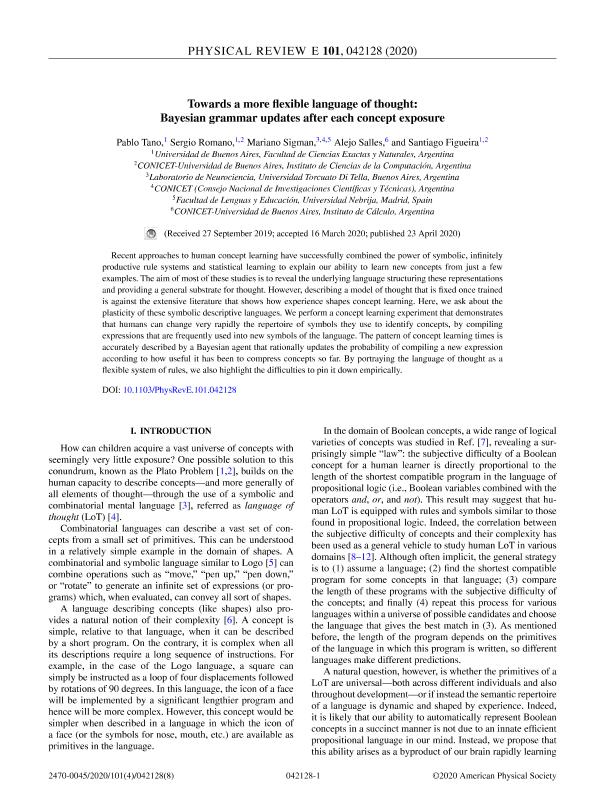Artículo
Towards a more flexible language of thought: Bayesian grammar updates after each concept exposure
Fecha de publicación:
04/2020
Editorial:
American Physical Society
Revista:
Physical Review E: Statistical, Nonlinear and Soft Matter Physics
ISSN:
2470-0053
Idioma:
Inglés
Tipo de recurso:
Artículo publicado
Clasificación temática:
Resumen
Recent approaches to human concept learning have successfully combined the power of symbolic, infinitely productive rule systems and statistical learning to explain our ability to learn new concepts from just a few examples. The aim of most of these studies is to reveal the underlying language structuring these representations and providing a general substrate for thought. However, describing a model of thought that is fixed once trained is against the extensive literature that shows how experience shapes concept learning. Here, we ask about the plasticity of these symbolic descriptive languages. We perform a concept learning experiment that demonstrates that humans can change very rapidly the repertoire of symbols they use to identify concepts, by compiling expressions that are frequently used into new symbols of the language. The pattern of concept learning times is accurately described by a Bayesian agent that rationally updates the probability of compiling a new expression according to how useful it has been to compress concepts so far. By portraying the language of thought as a flexible system of rules, we also highlight the difficulties to pin it down empirically.
Palabras clave:
Bayesian methods
,
Language of thought
,
Neuroscience
,
Learning
Archivos asociados
Licencia
Identificadores
Colecciones
Articulos (IC)
Articulos de INSTITUTO DE CALCULO
Articulos de INSTITUTO DE CALCULO
Articulos(ICC)
Articulos de INSTITUTO DE INVESTIGACION EN CIENCIAS DE LA COMPUTACION
Articulos de INSTITUTO DE INVESTIGACION EN CIENCIAS DE LA COMPUTACION
Citación
Tano, Pablo; Romano, Sergio Gaston; Sigman, Mariano; Salles, Alejo; Figueira, Santiago; Towards a more flexible language of thought: Bayesian grammar updates after each concept exposure; American Physical Society; Physical Review E: Statistical, Nonlinear and Soft Matter Physics; 101; 4; 4-2020; 0421281-0421288
Compartir
Altmétricas




